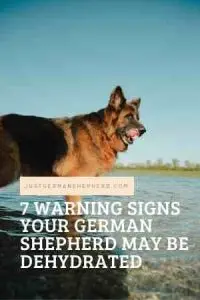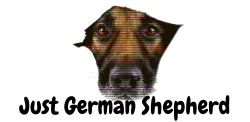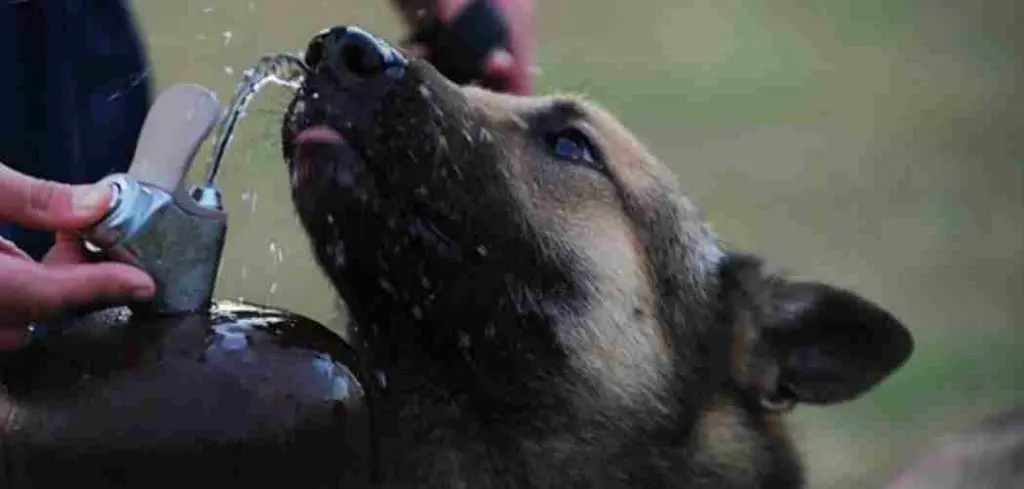
Water is essential to all mammals because it aids in normal bodily functions. It keeps the body temperature balanced and aids in absorbing nutrients during digestion. Aside from these, fluids are necessary for proper organ function and to lubricate the joints and muscles.
Signs of Dehydration in Your German Shepherd
There are telltale signs that your German Shepherd needs hydration. One sign that your dog needs water is panting. During an especially hot day, even without any movement or effort, your dog may lose moisture through sweating. He will need water to stabilize his temperature and replenish lost fluids. After running around or exercising, your dog will use up some fluids and will need to replace these. If you take your dog out for a walk, always bring water for him and yourself; after all, dehydration can also happen in humans. Even if you know there will be water where you are going; bring a water bottle to be on the safe side. While panting is not a sure sign that Fido is dehydrated, it is a sign that he feels hot and may need water.
Sure symptoms of dehydration may include the following.
- dry nose
- dry, sticky gums
- thick saliva
- dull, sunken eyes
- loss of skin elasticity
- no appetite
- low energy and lethargic
Dry nose and gums are symptoms of dehydration that are quite easy to spot. Normally, a German Shepherd has a cool, moist nose and wet, pink gums. You might also notice thick, sticky saliva when he lacks hydration. This is the reason for the dry sticky gums. You do not need to do anything to see that the nose is dry.
Aside from dry, sticky gums, feel free to check for capillary refill rate in his gums. To do this, you need to gently lift your dog’s lips, exposing his gums. Press on the gums with your finger for a second or two. The area that you pressed should turn white and then fill back in with the normal, healthy pink color almost immediately. If it takes more than three seconds to fill back in, you may have a dehydrated dog.
Experts and experienced German Shepherd owners will tell you that one of the first signs of dehydration is the loss of skin elasticity. This means it has been several hours or more than a day since your dog lacked access to water. It can also mean that he has not been drinking water adequately. Some dogs need to be reminded that they need water. I often tell my German Shepherds to “Drink water” after playing with them. They will go to their water bowls and drink even just a few laps. During summer or especially hot days, my dogs gulp in large amounts of water by dipping their entire muzzles in their bowls.
To check skin elasticity, lightly pinch the skin (experts recommend skin near the shoulder blades) and pull up a bit. Normally, it should go back down in a couple of seconds. If tenting occurs, you know, when the skin forms a raised tent or bump, offer some clean, fresh water to your dog.
Loss of appetite is a symptom of a dehydrated dog. This can be a tricky matter because appetite loss may have underlying conditions. Your doggo may have other ailments that cause loss of appetite, resulting in a lack of fluids. Some dog food varieties are moist and have fluids in them that can help hydrate your dog even when he does not drink much water. Not eating means your four-legged friend does not have the energy to be active. Lethargy and low energy levels should be a cause for alarm so always encourage him to eat and drink water.
What Causes Dehydration?
One of the main causes is no access to water at all. Dogs will drink from any source if they need water and, I mean, any source! If you do not leave a bowl of water, he will drink from the toilet or a canal, if he is outside. There are indeed some individual dogs that may not drink much water but most of our four-legged buddies will actively seek out water when they feel thirsty.
Other reasons for your dog to be dehydrated are diarrhea and vomiting. The two do not have to go together to have a severe effect. Either can be dangerous for your dogs. Vomiting and diarrhea together might have other underlying causes but can still cause dehydration. Some diseases and infections cause both symptoms. The sickness or infection needs to be seen by a vet for your dog’s safety.
A nursing dam, puppies, elderly dogs, and some smaller breeds are also prone to dehydration. Dams with puppies are understandably prone to lack of fluids since they are nursing. Younger puppies may also be dehydrated because they may not be able to easily access their mother’s milk. The same predicament goes for senior dogs.
Treating Dehydration
The first thing you do to treat your dehydrated dog is to offer cool, clean water. This will be helpful during hot summer months or if you exercise him daily. Check if your German Shepherd is eating consistently. He can get fluids and moisture from his moist food. If he is showing a lack of appetite, try to give smaller amounts of food to pique his interest.
Change his regular drinking water with one loaded with electrolytes and other nutrients. Stick to unflavored water since artificial flavoring can be unhealthy. Do not give him too much electrolyte water since dosages for pets may differ from humans.
Keep an eye on your dog if he exhibits severe symptoms. Heatstroke can be lethal for dogs. Bring him to the vet immediately if he is lethargic and refuses to move. The vet may have to hook him up to a drip to regulate his fluids.
Water is necessary for normal bodily functions. Dogs need a consistent source of fresh, clean water every day otherwise, he will be dehydrated. Your German Shepherd needs an ounce of water for every pound of his weight. If you leave for work every day, make sure your dog has adequate amounts of water at his disposal. Dehydration could have underlying causes such as cancer, diabetes and kidney diseases that need to be diagnosed by a certified vet. There are ways to check if your dog is dehydrated. Bring him to the vet if the signs are pointing to dehydration.

